Letter Or Notice Of Disagreement
[Your Name]
[Your Address]
[City, State, ZIP Code]
[Email Address]
[Phone Number]
[Date]
[Recipient's Name]
[Recipient's Position]
[Recipient's Department]
[Company/Organization Name]
[Address]
[City, State, ZIP Code]
Subject: Letter of Disagreement
Dear [Recipient's Name],
I hope this letter finds you well. I am writing to express my strong disagreement with [describe the issue or decision you're disputing]. I believe that there has been a misunderstanding or miscommunication, and I would like to address this matter formally.
I have carefully reviewed the [document/communication/decision] dated [date] regarding [briefly mention the subject matter]. After careful consideration, I must respectfully disagree with the conclusions reached in this matter. My disagreement primarily stems from [provide a clear and concise explanation of your reasons for disagreeing].
I value our professional relationship and believe in open and transparent communication. It is in the best interest of both parties to address and resolve this disagreement amicably. I kindly request that we engage in a discussion or review process to further assess the situation and explore potential alternatives.
I propose that we schedule a meeting or discussion at a mutually convenient time to thoroughly go through the concerns I've raised. This will provide an opportunity for me to present my perspective in more detail and for us to work together towards a resolution that benefits all parties involved.
I kindly request that any further actions related to the matter at hand be put on hold until we have had a chance to address my concerns and attempt to find a resolution. I believe that by working together and having an open dialogue, we can arrive at a solution that is fair and equitable.
Please let me know your availability for a meeting or discussion by [mention a reasonable deadline, e.g., within the next two weeks]. You can contact me at [your phone number] or [your email address] to coordinate a suitable time.
Thank you for your attention to this matter. I look forward to the opportunity to discuss this further and work towards a resolution.
Sincerely,
[Your Full Name]
[Your Job Title, if applicable]
[Your Signature (if sending a physical letter)]
Enclosure: [If applicable, list any documents or evidence you're attaching]
CC: [List of individuals you're copying the letter to, if any]
Formal Letter of Disagreement with a Contract Clause
Subject: Disagreement Regarding Contract Clause
Dear [Recipient's Name],
I am writing to formally express my disagreement with Clause [number] of the contract dated [date]. After careful review, I believe that the terms outlined in this clause are not in alignment with our prior discussions and create undue obligations on my part.
Specifically, the clause imposes [describe the issue, e.g., "an extended liability period" or "unexpected financial responsibility"], which was neither agreed upon during negotiations nor acceptable to me under current circumstances. I respectfully request a revision of this clause to reflect more balanced terms that are fair to both parties.
I value our professional relationship and would like to resolve this matter amicably. Please let me know a suitable time to discuss potential amendments.
Sincerely,
[Your Name]
Employee Letter of Disagreement with Performance Review
Subject: Response to Performance Review
Dear [Manager's Name],
I would like to thank you for taking the time to conduct my recent performance evaluation. While I appreciate the feedback provided, I respectfully disagree with some of the assessments and would like to clarify my perspective.
In particular, the comments regarding [specific performance aspect] do not fully reflect the contributions I have made in this area. For example, over the past quarter, I successfully [mention achievements, metrics, or projects], which I believe demonstrates stronger performance than what was documented. I also received positive feedback from colleagues and clients that further supports this.
I am open to discussing this in detail so we can ensure the review accurately reflects my efforts and contributions. I remain committed to continuous improvement and to meeting the team’s goals.
Sincerely,
[Your Name]
Parent Notice of Disagreement with School Decision
Subject: Concern Regarding Recent School Decision
Dear [Principal's Name],
I am writing as a parent of [child’s name] to formally express my disagreement with the recent decision made regarding [specific decision, e.g., "placement in a class," "suspension," or "extracurricular activity eligibility"]. I believe this decision is not in the best interest of my child’s academic or personal development.
My child has demonstrated [describe positive qualities, academic performance, or relevant circumstances] which I feel were not adequately considered. Additionally, the decision appears inconsistent with the school’s stated policies and past practices in similar cases.
I kindly request a review of this decision and a meeting to discuss possible alternatives that would better serve my child’s educational needs. I appreciate your attention to this matter and look forward to working toward a fair resolution.
Sincerely,
[Your Name]
Customer Email Disagreeing with a Billing Error
Subject: Dispute of Incorrect Billing Charge
Dear [Customer Service Team],
I am writing to dispute a charge of [amount] that appeared on my billing statement dated [date]. I believe this charge is incorrect, as I did not authorize or use the service/product it represents.
According to my records, I have consistently paid for [specific plan or product] without making any additional purchases or upgrades. This billing error has caused both inconvenience and concern, and I kindly request a prompt correction and adjustment to my account.
Please investigate this matter and confirm the resolution in writing. If necessary, I am prepared to provide supporting documentation. Thank you for your immediate attention.
Best regards,
[Your Name]
Casual Message Disagreeing with a Friend's Opinion
Subject: About What We Talked About
Hey [Friend’s Name],
I’ve been thinking about our conversation yesterday, and I just wanted to share that I don’t completely agree with your point of view on [topic]. I get where you’re coming from, but I see things a little differently.
From my perspective, [share your reasoning briefly]. That doesn’t mean I don’t value your thoughts—it just means we have different takes on the same issue, which is honestly what makes our conversations fun and interesting.
Looking forward to hearing more about your perspective next time we hang out. You always make me think harder about stuff.
Take care,
[Your Name]
Serious Letter of Disagreement with Medical Report
Subject: Disagreement with Medical Report Findings
Dear [Doctor’s Name/Medical Board],
I am writing to formally express my disagreement with the medical report issued on [date] concerning my health evaluation. The findings, as outlined in the report, do not reflect my current medical condition or the history of my treatment.
Several key details regarding my medical history, including [specific tests, treatments, or past conditions], were either overlooked or inaccurately represented. I believe this has led to an incomplete and potentially misleading conclusion.
I respectfully request a reevaluation of my medical records and, if necessary, an independent review by another specialist. Accurate documentation of my health is crucial for both my treatment and insurance purposes.
Thank you for your understanding and cooperation.
Sincerely,
[Your Name]
Tenant Letter Disagreeing with Rent Increase
Subject: Disagreement with Proposed Rent Increase
Dear [Landlord’s Name],
I recently received your notice regarding the proposed rent increase for my unit at [address]. While I value being a tenant in your property, I must express my disagreement with the terms of this increase.
The proposed adjustment is significantly above the average increase for similar properties in this area and does not seem proportionate to changes in market conditions. Additionally, no major improvements or repairs have been made to the property to justify such an increase.
I kindly request reconsideration of this proposal. I am willing to discuss a fair and reasonable adjustment that reflects the current housing market while still maintaining a positive tenant-landlord relationship.
Sincerely,
[Your Name]
What is a Letter or Notice of Disagreement and why is it needed?
A Letter or Notice of Disagreement is a written communication where the sender formally expresses disagreement with a decision, statement, or document.
Its purpose is to clearly state objections, provide reasons, and request reconsideration or corrections.
It ensures that disagreements are documented and can serve as evidence in future disputes.
Who should send a Letter or Notice of Disagreement?
- Employees who disagree with a performance review or disciplinary action.
- Customers disputing charges or incorrect billing.
- Parents challenging school decisions.
- Patients or families disputing medical reports.
- Tenants questioning rent increases.
- Business professionals disputing contract terms.
- Anyone affected by a decision or record they believe is incorrect or unfair.
To whom should a Letter or Notice of Disagreement be addressed?
- To the authority or individual responsible for the decision (e.g., HR, principal, landlord, manager).
- To the organization’s customer service or dispute resolution department.
- To regulatory or governing bodies when appealing official reports.
- To friends or colleagues directly when disagreement is personal or informal.
- In legal or contractual matters, often addressed to the opposing party or their representative.
When should you send a Letter or Notice of Disagreement?
- Immediately after receiving a decision, bill, or report you disagree with.
- Within the official appeal or dispute period (if specified).
- Before signing or finalizing contracts that include unfavorable clauses.
- When an inaccurate record could negatively impact your rights, reputation, or finances.
- When informal discussions fail to resolve the issue.
How do you write and send a Letter or Notice of Disagreement?
- Begin with a clear subject line.
- Politely state your disagreement early in the letter.
- Provide detailed reasons and, if possible, supporting evidence.
- Suggest a solution or request reconsideration.
- Maintain a respectful tone, even if the disagreement is serious.
- Send through the proper channel: formal letters for official matters, emails or messages for informal or quick disagreements.
- Keep a copy for your records.
Requirements and prerequisites before writing a disagreement letter
- Gather supporting documents (bills, reports, contracts, or policies).
- Review the original decision or statement carefully.
- Know the deadlines for submitting disputes.
- Understand the procedures or appeal process of the institution.
- Decide on the tone: formal for business/legal matters, informal for personal disagreements.
Common mistakes to avoid when writing a disagreement letter
- Being too emotional or disrespectful.
- Not providing evidence or clear reasoning.
- Missing the deadline for submission.
- Writing too vaguely or without focus.
- Ignoring formal requirements such as references, clause numbers, or report details.
- Forgetting to keep a copy of the letter for personal records.
Formatting guidelines for a Letter or Notice of Disagreement
- Length: usually one page for formal letters, shorter for casual messages.
- Tone: professional and polite, even when the disagreement is strong.
- Structure:
- Subject line
- Greeting
- Statement of disagreement
- Explanation and evidence
- Request for reconsideration
- Closing and signature
- Mode of sending: email for digital disputes, physical letters for legal or official records.
- Attachments: include any supporting documents.
What to do after sending a Letter or Notice of Disagreement
- Wait for acknowledgment of receipt.
- Follow up if no response is received within a reasonable time.
- Be prepared to escalate the matter to higher authorities if necessary.
- Keep records of all correspondence for future reference.
- If resolved, request written confirmation of the resolution.
Pros and cons of sending a Letter or Notice of Disagreement
Pros:
- Creates a formal record of your objection.
- Opens the possibility for corrections or reconsideration.
- Demonstrates that you are proactive and assertive.
Cons:
- May strain relationships if not worded carefully.
- Might delay processes or decisions.
- If poorly written, it could weaken your position instead of strengthening it.
Tips and best practices for writing a disagreement letter
- Stay calm and factual—avoid emotional wording.
- Back up your disagreement with evidence whenever possible.
- Use clear and concise language.
- Propose constructive solutions instead of only pointing out problems.
- Double-check grammar and clarity before sending.
- When in doubt, seek advice from a trusted colleague or professional.

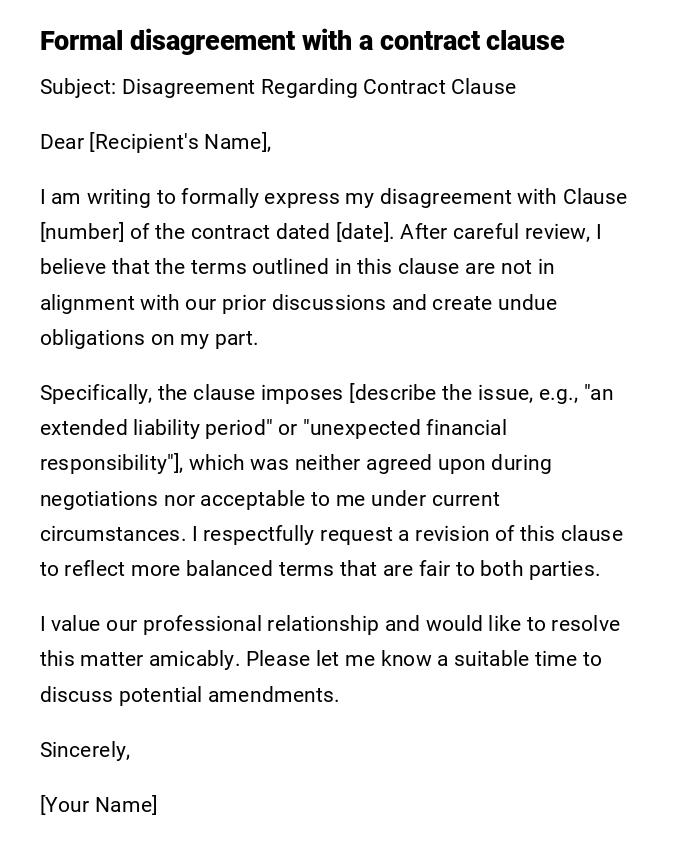
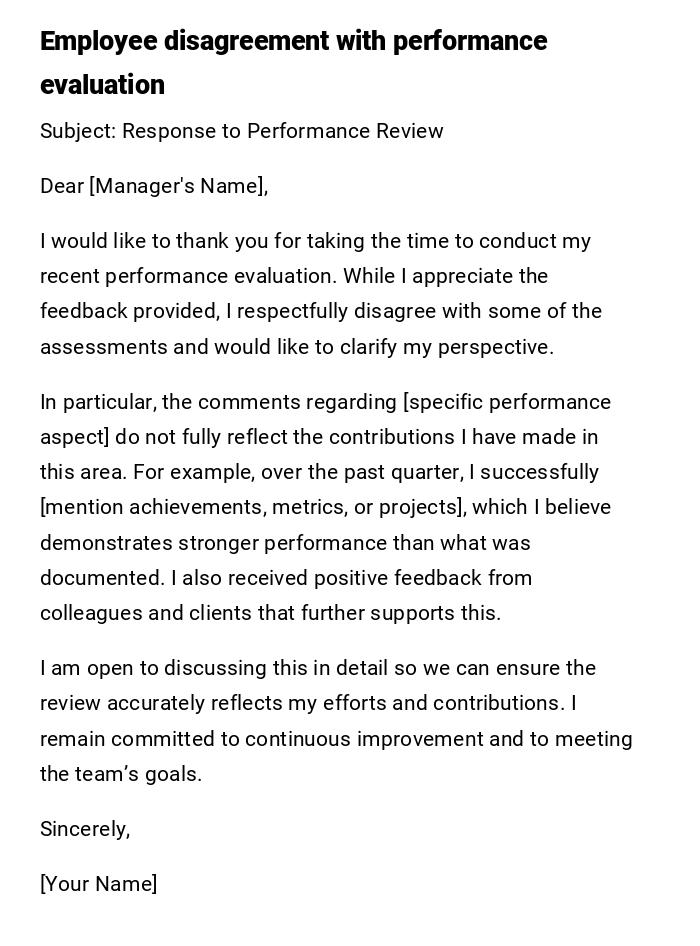
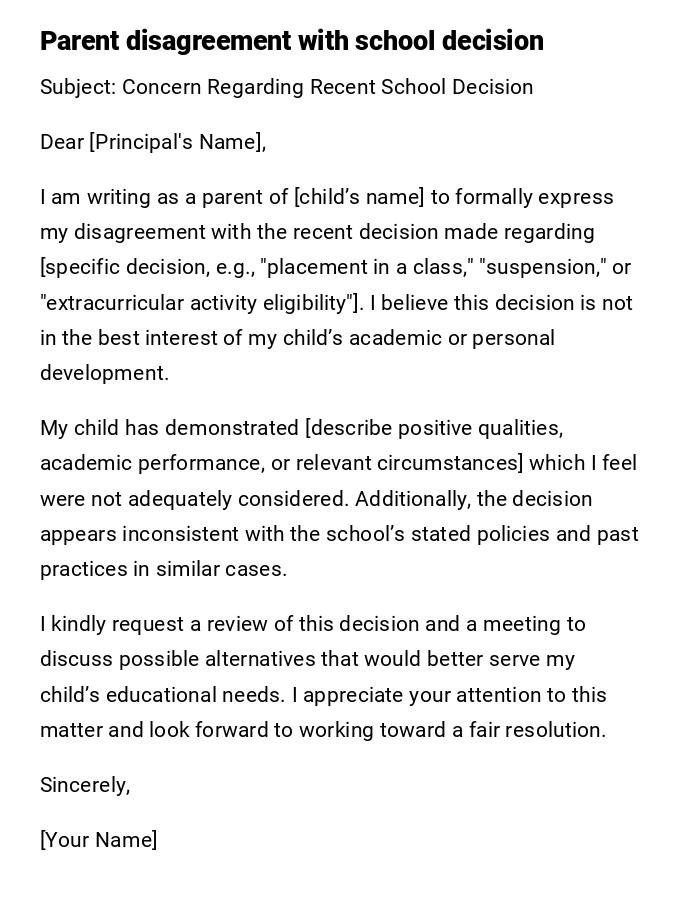

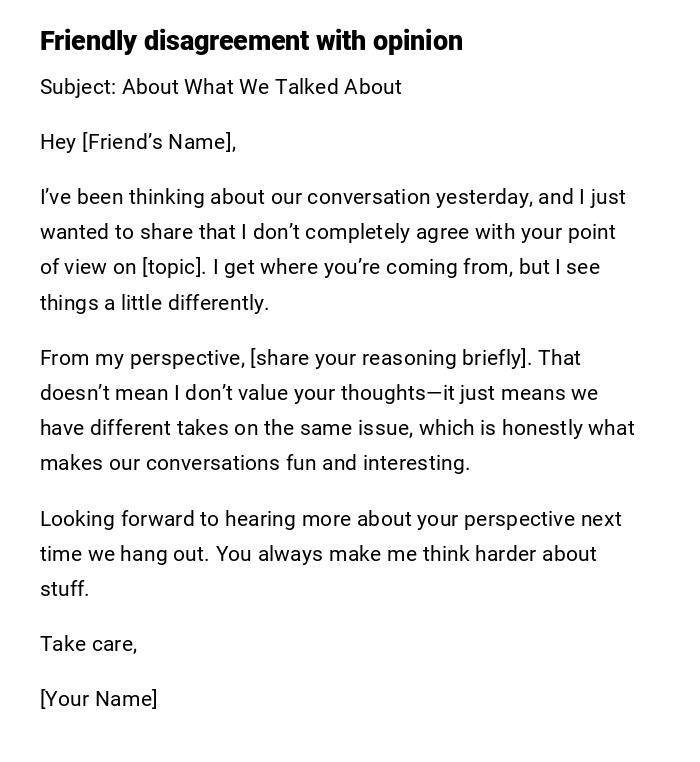

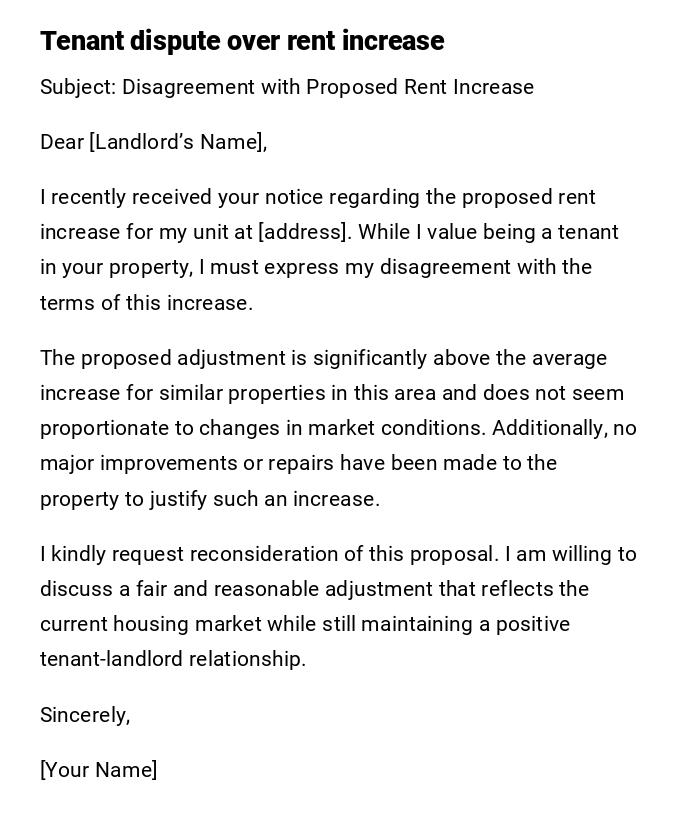

 Download Word Doc
Download Word Doc
 Download PDF
Download PDF